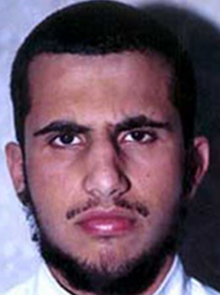Muhsin al-Fadhli
Muhsin al-Fadhli | |
|---|---|
 Photo of Muhsin al-Fadhli, according to the U.S. State Department. [1] | |
| Born | 24 April 1981[1] Kuwait |
| Died | 8 July 2015 (aged 34) Sarmada, Syria |
| Allegiance | |
| Service/ | |
| Years of service | Unknown–2015 |
| Rank | Leader of Khorasan's external operations[2] |
| Battles/wars | War in Afghanistan[3] Syrian Civil War[4] Military intervention against ISIL |
Muhsin al-Fadhli (24 April 1981 – 8 July 2015)[5] was an alleged senior leader of Khorasan, an offshoot of the al-Nusra Front, a branch of al-Qaeda.[6][7][2]
According to the U.S. Department of Treasury, al-Fadhli fought with the Taliban and al-Qaeda in Afghanistan as the second-in-command to an unnamed al-Qaeda leader. In Chechnya, Al-Fadhli fought against Russian forces and received military training.[8] According to media reports, al-Fadhli was a close confidant of Osama bin Laden, and one of a few people to be informed of the September 11 attacks, before they were launched.[6] He was born in Kuwait and used the aliases Abu Majid Samiyah, Abu Samia, Dawud al-Asadi, Muhsin Fadhil Ayyid al-Fadhli and Muhsin Fadil Ayid Ashur al-Fadhli.[1]
By 2002, al-Fadhli was raising funds for the attack on the French Maritime Jewel ship that was carried out later that year off the coast of Yemen.[8][9] Al-Fadhli was also suspected of being connected to the October 2002 attack on U.S. Marines on the Kuwaiti island of Faylaka.[8][10] In February 2003, al-Fadhli was convicted by a Kuwaiti court for financial support for terrorist activities and participating in military training in Afghanistan in order to carry out terrorist attacks. The Kuwaiti court issued a five-year jail sentence to al-Fadhi and the other three convicted terrorists.[11]
In the U.S. Department of Treasury’s 2005 designation of al-Fadhli, he is mentioned as “a major facilitator connected to the brutal terrorist, Abu Musab al-Zarqawi” who assisted fighters attacking U.S. and multinational forces.[8] The Saudi Ministry of Interior listed al-Fadhli as a suspected terrorist in 2005 and the United Nations added al-Fadhli to its Al-Qaida Sanctions List in 2011.[12]
In 2012, the United States State Department identified al-Fadhli as the leader of al-Qaeda in Iran and issued a $7 million reward for his capture.[1] According to the Treasury’s announcement, al-Fadhli started working with al-Qaeda in Iran in 2009. Al-Fadhli was subsequently arrested by Iranian authorities, but was released in 2011 after which he replaced Yasin al-Suri as the leader of al-Qaeda’s Iran-based facilitation network.[13] The Iran-based al-Qaeda web worked to finance terrorist activities in Afghanistan and Pakistan and transport its fighters to al-Qaeda’s affiliates in Syria through Turkey. According to the U.S. Treasury, al-Fadhli used his network of Kuwaiti terrorist donors to send money to Syria. Al-Fadhli also received “thousands of dollars” from Abd al-Malik Muhammad Yusuf Uthman Abd al Salam[SS1] , a Qatari ID holder and designated al-Qaeda and Al Nusra Front facilitator.[14][15]
In mid-2013, al-Fadhli was sent to Syria on behalf of al-Qaeda emir, Ayman al-Zawahiri, in order to mediate disputes between al-Qaeda's then Iraqi branch, the Islamic State of Iraq and the Levant (ISIL) and the al-Nusra Front. In February 2014, al-Fadhli was instrumental in influencing al-Qaeda to disassociate itself from ISIL.[16]
Death
Al-Fadhli was killed on 8 July 2015, when the United States carried out an airstrike, targeting a vehicle near the town of Sarmada in northwest Syria, according to the Pentagon.[5]
References
- ^ a b c "Rewards for Justice - al-Qaida Reward Offers". U.S. State Department. 18 October 2012. Retrieved 19 October 2014.
- ^ a b "French bomb-maker with Khorasan radicalized over 'several years'". Foreign Policy. 21 July 2015. Retrieved 23 July 2015.(subscription required)
- ^ "QI.A.184.05. Muhsin Fadhil Ayed Ashour Al-Fadhli". UN Security Council Committee. 24 January 2011. Retrieved 19 October 2014.
- ^ "Who is Muhsin Al-Fadhli? Khorasan Group leader believed dead in Syria airstrike". International Business Times. 24 September 2014. Retrieved 19 October 2014.
- ^ a b "Key al-Qaeda figure Muhsin al-Fadhli killed in U.S. airstrike in Syria - Pentagon". BNO News. Retrieved 21 July 2015.
- ^ a b "U.S. Suspects More Direct Threats Beyond ISIS". New York Times. 20 September 2014. Retrieved 19 October 2014.
- ^ "Al-Qaida Reasserts Itself With Khorasan Group". NPR. 3 October 2014. Retrieved 23 July 2015.
- ^ a b c d "Treasury Takes Action to Stem Funding to the Iraqi Insurgency". www.treasury.gov. Retrieved 2017-02-24.
- ^ Savage, Charlie (2014-02-20). "Guantánamo Detainee Pleads Guilty in 2002 Attack on Tanker Off Yemen". The New York Times. ISSN 0362-4331. Retrieved 2017-02-24.
- ^ Schmitt, Eric (2002-10-09). "THREATS AND RESPONSES: SKIRMISH; U.S. Marine Is Killed in Kuwait As Gunmen Strike Training Site". The New York Times. ISSN 0362-4331. Retrieved 2017-02-24.
- ^ "MUHSIN FADHIL AYED ASHOUR AL-FADHLI | United Nations Security Council Subsidiary Organs". www.un.org. Retrieved 2017-02-24.
- ^ https://www.webcitation.org/5km35qmi0
- ^ "Treasury Further Exposes Iran-Based Al-Qa'ida Network". www.treasury.gov. Retrieved 2017-02-24.
- ^ http://www.defenddemocracy.org/content/uploads/documents/11717_Weinberg_Qatar_Report.pdf
- ^ "Treasury Designates Twelve Foreign Terrorist Fighter Facilitators". www.treasury.gov. Retrieved 2017-02-24.
- ^ "Report: Former head of al Qaeda's network in Iran now operates in Syria". Long War Journal. 25 March 2014. Retrieved 19 October 2014.
